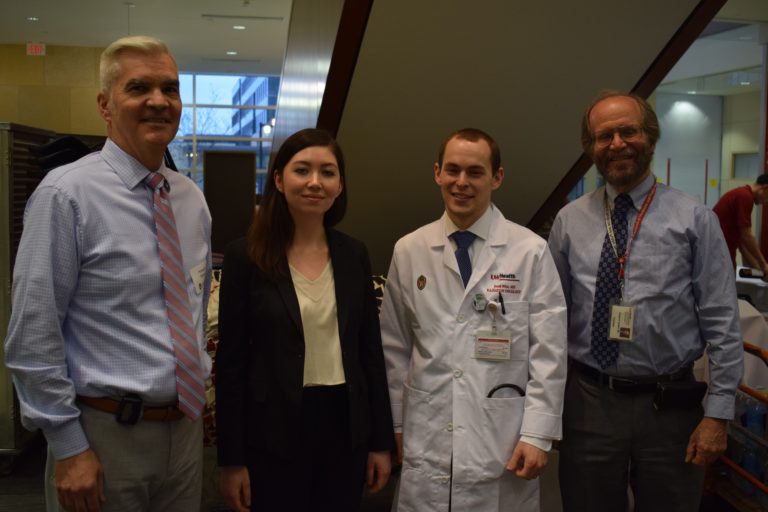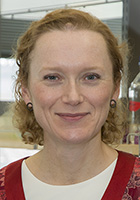Our Goal
The goal of the Carbone Cancer Center Heidi Dvinge and Patti Keely Trainee Honor Society is to grow the involvement of trainees with the UW Carbone Cancer Center and foster a community of service. Trainees include Cancer Biology students, trainees who are working with our faculty and trainees doing cancer related research.
Our Purpose
Our purpose of the Carbone Cancer Center Heidi Dvinge and Patti Keely Trainee Honor Society is to serve and provide value to cancer research trainees. Specifically, trainees can expect:
- Opportunities to interact with other trainees of all levels and research areas
- Funding opportunities
- Grass roots voice for trainee needs
Useful Links

Contact Us
Mary Nutt, Assistant Director of Translational Research: mpnutt@wisc.edu
Society Details
This is an accordion element with a series of buttons that open and close related content panels.
Activities and Benefits
- Quarterly advisory panel meetings
- Recommendations on how they could benefit from the center, planning for honors opportunities, ideas to unify cancer related trainees
- Review grant applications for undergraduate educational grants
- Serve on the Carbone Research Retreat planning committee
- Recommendations/Judging of trainee presentations and awards
- Possible Honors
- Society trainee specific funding opportunities (travel awards, small research awards)
- Opportunities to speak at community events
- Host Cancer Center tours or nominate other to lead tours
- Best paper awards
- Grand Rounds presentation
Membership Process
- Program Leaders send out call to faculty via program list serve
- Faculty nominate students via email to program leaders
- Open call to students –they should talk to their mentor if interested
- Program Leaders: Select 2 students related to each program
- 2 year term (will add 6 trainees in year 2)
Criteria for Selection
- Trainee levels eligible – graduate, medical, postdoctoral, residents, fellows
- Conduct cancer-focused research and/or are engaged in oncology-related clinical training
- Mentor recommendation on trainee demonstration or expression of research excellence, professionalism, dedication
- Demonstrated involvement in research events, committees, cancer related organizations
- Please keep in mind UW-Madison’s statement on diversity:
Diversity is a source of strength, creativity, and innovation for UW–Madison. We value the contributions of each person and respect the profound ways their identity, culture, background, experience, status, abilities, and opinion enrich the university community
Application Process and Components
- Application via SMApply, documents can be uploaded by trainee
- Statement of application from trainee
- Description of research area
- Letter of support from mentor
- Resume/biosketch
This society is named in honor and memory of two amazing scientists

Heidi Dvinge, PhD, Assistant Professor of Biomolecular Chemistry and member of the Carbone Cancer Center, passed away unexpectedly in September 2019. With great sorrow over the loss of a brilliant young scientist, colleague, mentor and friend, we honor her memory and her scholarly work. Dvinge had been a member of the School of Medicine and Public Health faculty. Her research program was dedicated to understanding how misregulation of RNA processing contributes to disease, and how changes that occur in RNA splicing processes in cancer cells might be exploited to allow new therapeutic approaches. Her research interwove the disciplines of molecular biology, biochemistry, bioinformatics and oncology with a combination of precision and creativity. “She had the knowledge and ability to conduct science involving big data, but at the same time, she had finesse for experimental science in the lab — a very rare combination.” Says Emery Bresnick, PhD, leader of the UW Carbone Cancer Center’s Genetics and Epigenetics Program. The scientific world took note of Dvinge’s brilliance: Over the past five years alone, her publications have been cited more than 4,600 times.
She was a skilled mentor to undergraduates and graduate students, serving as a faculty mentor in the Integrated Program in Biochemistry, the Graduate Program in Cellular and Molecular Biology, and the Genetics PhD program.
Patricia Keely, PhD, was Professor of Cell and Regenerative Biology and co-leader of the Tumor Micro-environment Group at Carbone Cancer Center. It would be easy to simply say Dr. Patti Keely was a world-class, nationally recognized breast cancer researcher at the University of Wisconsin School of Medicine and Public Health. And, that would be correct – but only part of the picture. Patti transformed her personal cancer diagnosis into experiential learning opportunities that inspired her to dive deeper in search of a cure for the disease. Keely died in 2017 of advanced pancreatic cancer. Her prolific research career, which includes countless publications, was most recently focused on cell signaling related to cellular differentiation and transformation and included her sentinel research on the role of the cellular micro-environment in the behavior of breast cancer cells.
Her leadership, mentor ship and her collaborative nature allowed her to make a tremendous impact in this world, according to Dr. Howard Bailey, associate dean for oncology and director of the Carbone Cancer Center. “She leaves behind a remarkable legacy as an outstanding scientist, dedicated mentor, strong academic leader, and caring and committed person,” said Dr. Robert Golden, dean of the School of Medicine and Public Health.
